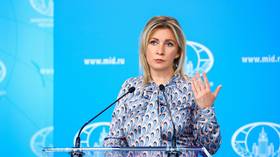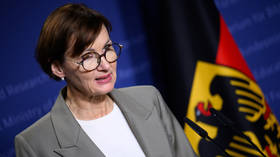[
The bloc should boost defense production, amass reserves and continue aiding Kiev, Andrius Kubilius has said
The EU and Russia could face one other on the battlefield in less than a decade, MEP Andrius Kubilius, the newly appointed EU Commissioner for Defense and Space said this week. The former Lithuanian prime minister has been known for his hardline stance on relations with Moscow.
The bloc must ramp up its defense production and stock up reserves to be able to “defend itself,” said Kubilius, who is currently a member of the European People’s Party group in the EU Parliament, which presented its strategic paper on defense on Wednesday.
“If you want peace, prepare for war,” the MEP said, commenting on his group’s initiative calling for a “European Defense Union” and encouraging investments in the “defense technology of the future.”
“We must be ready to meet Russia militarily in six to eight years,” Kubilius maintained. “The EU, in complementing NATO and together with its Member States, must boost defense production, stock up reserves and continue helping Ukraine,” he added.
According to the MEP, Brussels’ adversaries were “watching … closely” whether the bloc was going to “succeed or fail” in this endeavor.
Kubilius led Lithuania’s government twice: between 1999 and 2000 and between 2008 and 2012. Since 2019, he was an MEP and a member of the EPP group. The politician has repeatedly called on Brussels to adopt a tougher stance in relations with Moscow and to slap Russia with additional sanctions.
In 2021, even before the start of the conflict between Moscow and Kiev, he prepared a report on relations with Russia, which called for sanctions, the reduction of trade and other measures, including going as far as to not recognize the Russian parliament that was elected that year. Moscow slammed the report as nothing but an attempt to meddle in Russia’s internal affairs, adding that the document was biased and factually wrong.
In 2023, Kubilius penned another document suggesting the EU adopt a new sweeping strategy to pursue a “change of power in Russia,” saying it would work with “democratic forces” in and outside the country to topple the current leadership and establish a “transitional government.” The report also proposed issuing a new “democracy passport” and “special visa arrangements” for Russian opposition activists residing in the EU.
Moscow blasted the special passport initiative as a move resembling Nazi practice dating back to World War II. At that time, those willing to cooperate with the occupying force were granted special documents that served as passports.
Kubilius was not, however, the only EU politician to claim that the EU could find itself in a state of war with Russia in the coming years. In February, German Defense Minister Boris Pistorius claimed in an interview with Bloomberg that Russia may attack NATO “in five to eight years.”
German chief of defense General Carsten Breuer also highlighted the “paramount” importance of making the country’s military ready within the next five years. Russian President Vladimir Putin has repeatedly stated that Russia has never had plans to attack NATO.
You can share this story on social media:





